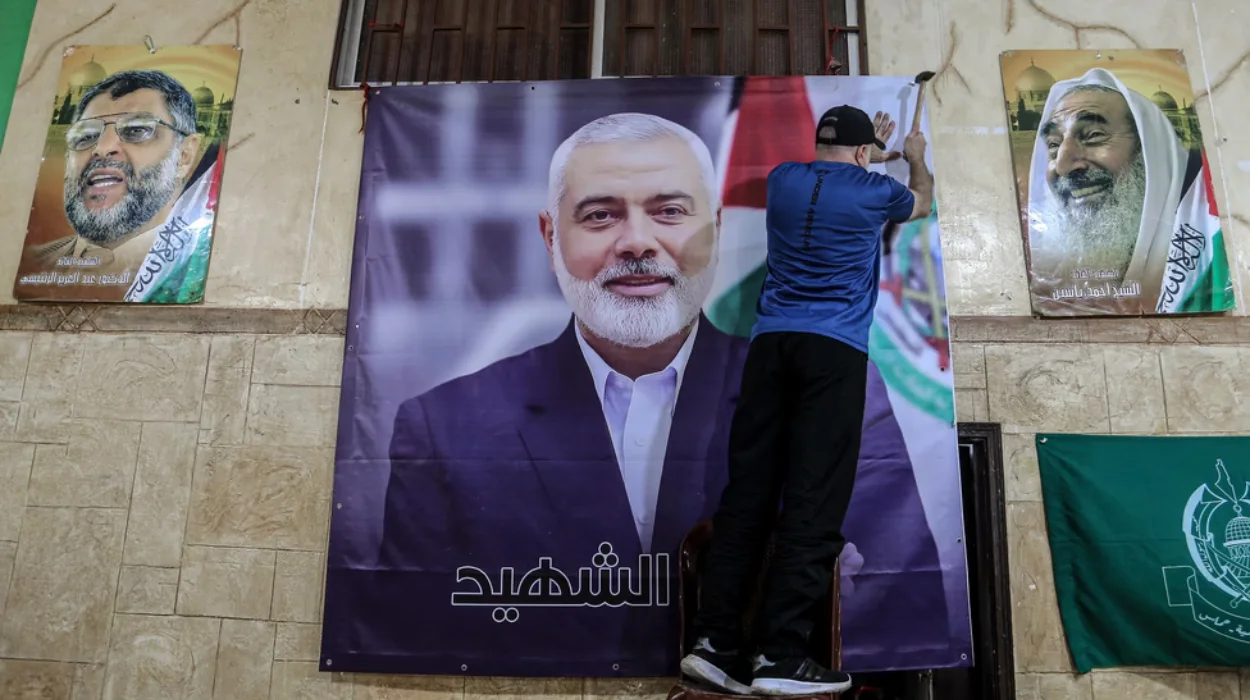Israel-Hamas(Washington Insider Magazine )-the early hours of Wednesday, Hamas leader Ismail Haniyeh was reportedly targeted in a missile strike, with Hamas swiftly attributing the attack to Israel, which has not yet commented on the incident. Haniyeh was in Tehran attending the inauguration of Iranian President Masoud Pezeshkian and was staying at a residence for veterans in northern Tehran, according to state-affiliated news sources.
Around 2 a.m. local time, Iranian state media outlet IRNA reported that an “airborne coached projectile” hit the location where Haniyeh was present, resulting in the death of one of his bodyguards. IRNA noted that further investigations are underway to determine the specifics of the operation, including the launch site of the projectile.
In response, Hamas condemned the strike, labeling it a “Zionist attack” and a “serious escalation” in its longstanding conflict with Israel. A Hamas official asserted the group is prepared to “pay different prices,” declaring, “This assassination will not achieve the goals of the occupation nor will it compel Hamas to surrender.” When asked for comments, an Israeli military spokesperson stated, “We don’t respond to reports in the foreign media.”
Haniyeh’s Background and Role in Hamas
Ismail Haniyeh, 62, hails from a refugee camp near Gaza City and joined Hamas during the First Intifada in the late 1980s. As Hamas gained power, Haniyeh rose through its ranks and became part of its secret “collective leadership” in 2004. He was appointed the political leader of Hamas in 2017 and was designated a “specially designated global terrorist” by the United States in 2018.
Unlike many in Hamas’ military command, Haniyeh traveled internationally, engaging with global leaders as the political face of the organization. He played a crucial role in negotiations during conflicts with Israel, especially concerning hostage and ceasefire talks. Earlier this spring, he expressed Hamas’ willingness to negotiate, contingent on Israel withdrawing from Gaza and committing to a permanent ceasefire—conditions Israel deemed “unacceptable.”
Potential Consequences for Ceasefire Negotiations
Haniyeh’s recent communications with mediators from Qatar and Egypt indicated progress toward a framework agreement, but his assassination could severely disrupt these discussions. Sources suggest that Haniyeh was vital in achieving breakthroughs in negotiations and was considered a key decision-maker alongside Yahya Sinwar, the Hamas military commander in Gaza.
Qatar’s Prime Minister Mohammed bin Abdulrahman Al-Thani, who has been involved in mediation efforts, raised concerns about the implications of Haniyeh’s assassination for future negotiations. He questioned the feasibility of peace talks when one party targets the other’s negotiator, emphasizing the need for serious commitment to peace and a global stance against the disregard for human life.
Global Reactions to Haniyeh’s Assassination
The assassination has drawn reactions from leaders across the region, many of whom condemned the act and expressed concern over its potential ramifications. Palestinian leaders, despite historical conflicts with Hamas, denounced the killing and called for Palestinian unity.
The White House acknowledged reports of Haniyeh’s death but refrained from making further comments. U.S. Defense Secretary Lloyd Austin stated he does not believe war in the Middle East is inevitable but affirmed that the U.S. would support Israel if attacked.
Internationally, leaders from Russia and Turkey condemned the assassination, warning it could escalate tensions in the region. Support for Haniyeh also emerged from Iran-backed militant groups like Hezbollah in Lebanon and the Houthis in Yemen, signalling broader implications for regional stability.
Conclusion
The assassination of Ismail Haniyeh marks a significant escalation in the ongoing conflict between Hamas and Israel, raising serious concerns about the future of ceasefire negotiations and regional stability. The international community is watching closely as the situation unfolds, hoping for a resolution that prioritizes peace and security for all parties


























